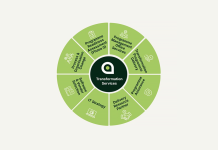David Littler, the UK General Manager at enChoice UK, discusses how AI-powered search is transforming content repositories within organisations, thereby improving user access to information
In most organisations, content repositories are treasure troves. They contain vast numbers of documents, emails, contracts, presentations, reports, and records created over decades. Yet despite their richness, these repositories often resemble digital filing cabinets, full of value but difficult to navigate. Traditional search tools, built on simple keyword matching, rarely provide the context or precision that modern business users need.
Unlocking this hidden knowledge requires a new approach. By applying Artificial Intelligence, and specifically AI-powered search, organisations can transform their content repositories into living knowledge hubs. Instead of sifting through endless results, employees can ask nuanced questions and receive answers grounded in the actual meaning of the content.
The limits of keyword search
Keyword-based search engines worked well when data volumes were smaller and content types more uniform. But today’s repositories contain everything from structured records to scanned documents, PDFs, emails, images, and video transcripts. Traditional search struggles with ambiguity: a simple query for ‘account’ might return a mix of bank account documents, customer records, and user permissions. Synonyms create more gaps. Someone looking for ‘invoices’ may miss documents labelled ‘bills’ or ‘statements’.
Even when the right files are returned, the system cannot prioritise them by context, so a search for ‘merger’ might bring up corporate acquisitions and software functions with equal weight. The result is frustration. Users often spend hours searching for the right content, or worse, fail to find critical information at all. Research suggests knowledge workers can spend nearly a third of their time looking for information, a drain on productivity and a risk if vital records remain hidden.
How AI-powered search works
AI-powered search takes a different approach, focusing on meaning rather than word matches. Natural language processing enables systems to parse full questions, such as “Show me all customer complaints about billing errors in 2024,” and interpret the intent behind the query. Machine Learning models analyse documents, extract entities such as people, places, and products, and map relationships to create a semantic layer.
This deeper understanding enables the engine to evaluate relevance in context. An inquiry about sustainability initiatives will return reports on environmental programmes even if the phrase is absent. Modern AI search can also work across formats, analysing scanned PDFs with optical character recognition, transcribing audio and video, and classifying images. Over time, it learns from user behaviour, steadily improving results.
The outcome is a search experience that feels closer to asking a colleague for help than typing keywords into a box. Users can frame questions in natural language and uncover insights that would otherwise remain buried.
Business benefits of AI Search
The benefits extend far beyond convenience. Legal teams can instantly surface all related precedents for a case, while engineers can locate past design documents to accelerate new projects. Decision-makers can query repositories directly, instead of relying solely on reports, to gain timely insights.
In highly regulated industries, the stakes are even higher. Where you are required to retrieve precise records quickly for audits or compliance checks. AI-powered search reduces the risk of missing critical documents and ensures results are comprehensive. At the same time, it preserves institutional knowledge by making it easier to reuse content created by employees who may no longer be with the organisation. Customer service also improves, since teams can access the right information instantly and respond more accurately.
Real-world applications
The technology is already reshaping industries. Banks use it to sift through millions of documents during anti– money laundering investigations, surfacing suspicious transaction records in hours rather than weeks. Healthcare providers rely on it to search across clinical notes, lab results, and imaging reports, supporting both diagnosis and research. Law firms deploy AI search during e-discovery, cutting time and costs dramatically. Manufacturers draw on it to mine past specifications, maintenance logs, and supplier documents, reducing delays in product development.
Implementation considerations
Adopting AI-powered search is not as simple as flipping a switch. Content must be accessible and cleaned of duplicates and irrelevant material. Metadata still matters, although AI can automatically enrich it; a baseline of titles, authors, and dates helps ensure accuracy. Security is paramount, as the system must respect access controls so users only see what they are authorised to view.
Scalability is another concern. Enterprises generate terabytes of content each year, so platforms must be capable of handling billions of documents without performance issues. Finally, change management is crucial. Employees must trust the system and understand how to use it effectively. Early pilots and success stories help build adoption.
The road ahead
AI-powered search is evolving quickly. Generative AI models now allow not just retrieval but answer generation, synthesising a response to a question and citing the underlying documents. Asking, “Summarise our top three supplier risks in 2024,” generates a concise, evidence-backed response in seconds. Voice-driven enterprise search is emerging, as is seamless cross-repository discovery that spans ECM systems, cloud drives, and email archives. Predictive search capabilities are also developing, anticipating user needs based on role, activity, and context.
Enterprise content repositories hold immense hidden value, but only if people can access them. Keyword search, once sufficient, is no longer up to the task in an era of exponential data growth and complex information needs. AI-powered search unlocks that hidden knowledge, transforming repositories from static archives into engines of productivity, compliance, and innovation.
By embracing AI-driven discovery, organisations move beyond search to true understanding. They unlock the knowledge already present in their systems and turn information from a burden into a strategic asset. In doing so, they not only gain efficiency but also open the door to insights and innovations that were previously hidden in plain sight.
To explore how enChoice can help your organisation unlock hidden knowledge, contact David Littler at dlittler@enchoice.com.

This work is licensed under Creative Commons Attribution-NonCommercial-NoDerivatives 4.0 International.











